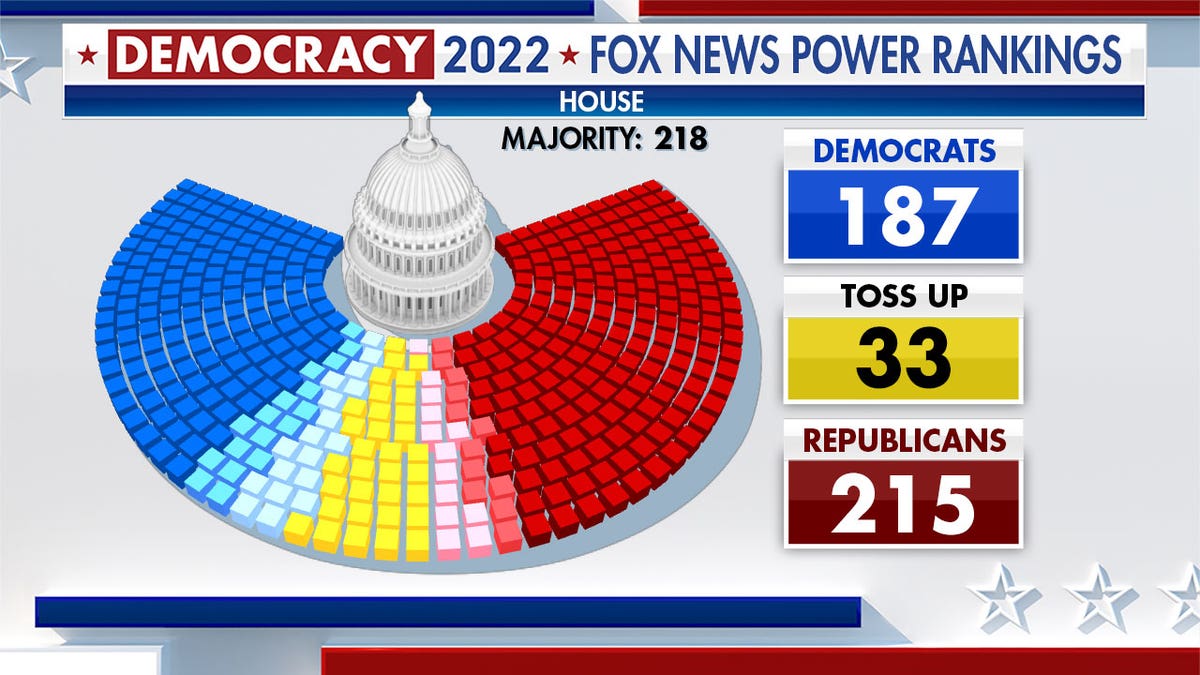The midterms might be a GOP wave after all
Pollster Ed Goeas on whether Republicans have regained momentum going into November.
What are the midterm elections?
Midterm elections occur every four years, halfway through a president’s term in office.
Each midterm election cycle, Americans have the chance to vote on candidates for the House of Representatives, Senate, and state and local offices.
The outcome of the midterm elections will determine what party controls each chamber, influencing legislation that is considered and Congress' willingness to work with the White House. The midterm elections are the often seen as referendum on a president's four-year term in office, particularly for new presidents.
In midterm years, all 435 seats within the House of Representatives are up for election, compared to about one-third of Senate seats. At the state level, 36 states hold elections for governor and other local officials in midterm elections.
A SIMPLE GUIDE TO MIDTERM ELECTIONS, HOW THEY AFFECT THE PRESIDENCY, AND MORE
What are runoff elections?
A runoff election is a second election that is held when neither candidate meets the required threshold of votes for victory. The threshold of required votes in runoff elections is determined by each state, but is typically a simple majority — 50% or more of votes.
Runoff elections can be held for primary and general elections but are more commonly used in primary elections. Currently, 10 states employ a runoff election system for their primaries. Only Georgia and Louisiana use runoff elections in general elections.
Only the top two candidates receiving the most votes will move on to a runoff, typically held shortly after the first election at a date predetermined by each state.
FOX NEWS POWER RANKINGS: DEMS, GOP LOCKED IN CLOSE BATTLE AS FINAL MONTH OF CAMPAIGNING BEGINS

Georgia GOP Senate candidate Herschel Walker, left, and Democratic Sen. Raphael Warnock, right, will face off in a runoff election if neither candidate receives a majority vote on Election Day. (Getty Images)
What is an incumbent?
An incumbent is a current officeholder of an elected position who is running for reelection. Incumbents are typically thought to benefit from an "incumbent advantage" due to the high frequency of current officeholder winning re-election each election cycle. In fact, in the 2020 elections, 95% of House incumbents and 84% of Senate incumbents won re-election, according to an Open Secrets report.
Allan Lichtman, a long-time historian of American history teaching at American University, told NPR that incumbents benefit from "name recognition; national attention, fundraising and campaign bases; control over the instruments of government; successful campaign experience; a presumption of success; and voters' inertia and risk-aversion."
FOX NEWS POLL: POLARIZATION DEFINES THE MIDTERM ELECTIONS

Arizona's gubernatorial race has become one of the most high-profile matchups this election cycle with candidates Katie Hobbs, left, and Kari Lake, right. (Reuters)
What does gubernatorial mean?
"Gubernatorial" is anything referring or related to a governor or governor's office. An election for state governor will often be referred to as a gubernatorial race.
Of the 36 gubernatorial races taking place in the 2022 midterm elections, the races to watch are in Arizona, Kansas, Nevada, New Mexico, Oregon and Wisconsin — all considered toss-ups according to Fox News' Power Rankings.
What are exit polls?
Exit polls, also known as election exit polls, are surveys conducted of voters immediately after they leave polling stations. Exit polls are often looked to as an indicator of an election's results, especially on election night.

Power rankings indicating a 33 seat toss up in the House with the GOP holding 215 and Democrats holding 187. (Fox News)
What are the Fox News Power Rankings?
The Fox News Power Rankings are projections for political races nationwide. They provide insight into the competitiveness and outcome of election races. The rankings are derived from Fox’s data-driven model and then categorized into one of seven labels indicating the competitiveness and expected outcome of the individual election.
- Toss-up: This race could go either way.
- Lean D or Lean R: One party has a slight edge, but it remains highly competitive.
- Likely D or Likely R: One party has a clear edge, but it is still competitive.
- Solid D or Solid R: This race is not competitive.
WHAT ARE THE FOX NEWS POWER RANKINGS?
This year the midterm elections will be held on Nov. 8, 2022.
CLICK HERE TO GET THE FOX NEWS APP
Fox News’ Remy Numa contributed to this report.














































